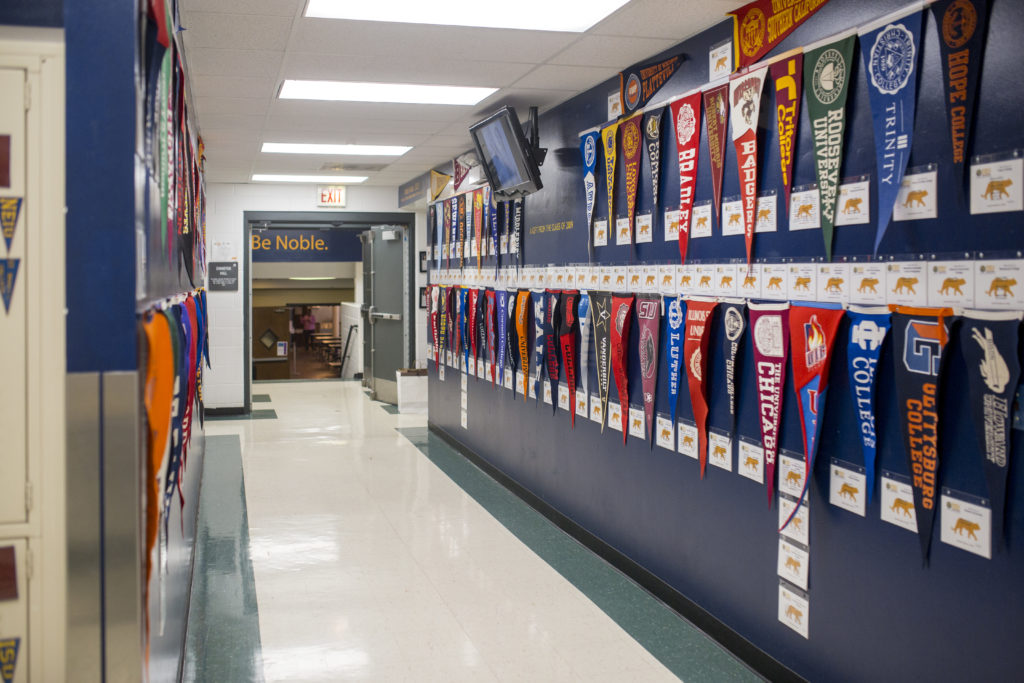Today, Joe Biden and Kamala Harris will embark on the bold endeavor of leading our nation out of the COVID-19 pandemic. This critical juncture follows an unprecedented year that exacerbated centuries-old economic, health and educational disparities that have disadvantaged people of color. Biden’s initial recovery plan proposes critical COVID relief efforts, including goals for rapid vaccination, emergency funding for education, and investments to fuel an economic recovery.
As an educator who previously oversaw college success work at Chicago Public Schools and who now serves nearly 2,000 CPS alumni annually as a college dean at National Louis University, I view this moment in time with both hope and concern.
While I remain hopeful about our city and nation building back better in 2021, I also know that we educators are so overwhelmed with trying to help our students survive in the near-term that we are not focusing enough on what is necessary for them to thrive in the long-term. Both K-12 schools and colleges are working to address immediate problems like food insecurity so that students don’t go hungry and technology gaps so that students can show up to virtual class. At the college level, we have been distributing millions in emergency funds to thousands of students who lost their jobs or got sick and could not afford their daily living expenses. At the same time, K-12 school districts are facing the difficult, overriding questions of whether schools will be remote or in-person, and how students and staff will be kept safe.
All of this is indispensable work, yet amid all the urgency to address the present moment, we risk overlooking the long-term interests of our students. We must each keep one eye squarely set on the present while also keeping one eye pointed toward the future.
When It Comes to College Enrollment, the Classes of 2020 and 2021 Are Struggling
While we claim to be more focused on combating structural racism now than ever before, college application rates for the high school class of 2021 are currently way down from a year ago. Recent data released by the National Student Clearinghouse also show that 2020 college enrollment rates are down 21.7% nationwide from the prior year – and down even further for Black and Latinx students; meanwhile, the vast majority of today’s careers require a college degree.
We know that in Chicago there are racial inequities in college degree attainment as well as a racial wealth gap for Black and Latinx people, rooted in hundreds of years of societal racial oppression and unequal access to K-12 and higher education. Evidence is clear that a college degree leads to greater health, wealth, and happiness for an individual. In parallel, individuals’ college degrees benefit society through higher tax revenues, stronger levels of civic and community involvement, and less strain on social services and the criminal justice system.
Yet more than a decade of progress in Chicago Public Schools toward leveling the college playing field for students of color now stands in jeopardy. Our K-12 schools are already working tirelessly and cannot do this work alone. Our city could be doing much more to help students hold on to their dreams.
If we do not take immediate action, our young people’s college enrollment rate could plummet even further in fall 2021. We risk letting an entire generation fall off the path to upward economic mobility, reversing the city’s positive education strides over the past 15 years, and exacerbating the city’s racial wealth gap.
A “College Is Key Collective” Could Support Potential College Students Now
It’s time for our city to come together to re-prioritize the college enrollment movement. Mayor Lightfoot, nonprofits, local philanthropy and higher education can lead the way. Here’s how we could get it done:
First, to rally us all together, Mayor Lightfoot should announce this work as a new shared community-wide priority that is critical to the City of Chicago’s future: the “College is Key Collective.”
Then, to ease the financial worries that now hold many students back from applying, local foundations and corporations can create a new pool of scholarship funds. Those funds could become the incentive to encourage current high school students to complete three or more college applications by March 1. If 75% of this year’s CPS graduating class met this goal, it would take $20 million to offer each of them $1000 toward their first year of college.
To support students to reach the college application goal, we’ll need to increase the pool of college application coaches, too. A recruitment drive could bring corporate and other volunteers to already-established organizations like iMentor. These groups can quickly train volunteers to do the work; they simply need more people power to reach every young scholar.
At the same time, colleges and universities must do everything they can to keep tuition rates affordable, offer additional scholarships, and be flexible about admissions requirements, given the barriers to application that students are facing.
Finally, at the state and federal level, additional grants targeted toward low-income Class of 2020 and 2021 high school graduates – in every city and state – could help to reverse the negative college-going trends we are seeing nationwide amid COVID.
Actions speak louder than words, and 2021 offers an opportunity to actively tear down centuries of racial inequity by coming together to lift up our students of color, to help them not only survive but also thrive on their paths to college, through college and beyond.
Aarti Dhupelia
Latest posts by Aarti Dhupelia (see all)
- For Chicago to Build Back Better, College Is Key - January 20, 2021
